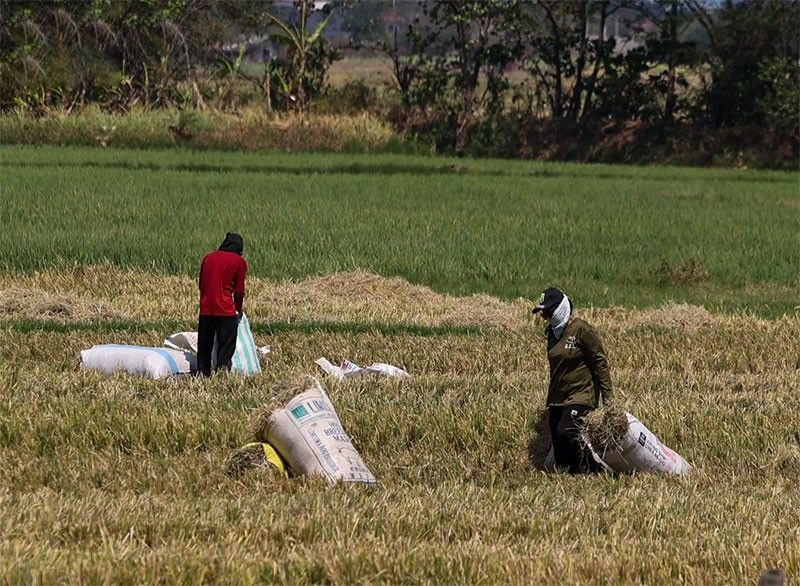Tighter control over rice imports, direct buying from farmers eyed

MANILA, Philippines — The Department of Agriculture (DA) is seeking tighter control over the rice industry by restricting imports during harvest seasons and inspecting warehouses of traders and importers.
In a meeting of the House committee on agriculture yesterday, Agriculture Undersecretary Christopher Morales discussed some of the department’s recommendations for the extension of the rice competitiveness enhancement fund (RCEF).
One of the recommendations was to allow the DA to impose timing restrictions on the issuance of sanitary and phytosanitary import clearances (SPSICs) for rice imports.
This would allow the government to “enhance” its control over rice import arrivals, particularly during harvest seasons, Morales said.
“We propose that imported rice must arrive before the specified date indicated in the issued SPSICs, with enforced fees and measures for low or non-utilization to ensure timely arrival,” said Morales, who oversees the DA’s rice industry development program.
Under Republic Act 11203 or the Rice Trade Liberalization (RTL) Law, the Bureau of Plant Industry cannot impose timing and volume restrictions for imported rice in the SPSICs it issues. The BPI is an attached agency of the DA, mandated to oversee rice importation.
The regulatory functions of the BPI must also be strengthened by allowing the agency to require mandatory registration of the warehouses of rice importers, Morales said.
He said the BPI must be given the power to regularly inspect the registered grain warehouses to ensure that these are compliant with SPS standards.
Morales also disclosed that the DA is proposing that the secretaries of the Departments of Agriculture and Trade and Industry must be empowered to allow the government to import rice “under specified conditions.”
The agriculture chief should also be given the power to “disallow” exports during food security emergencies, Morales said.
The DA proposed the extension of the RCEF until 2030 and the budget of its components reallocated to address the current needs of rice farmers, Morales said.
Created under the RTL law, the RCEF seeks to improve the competitiveness of local rice farmers through the provision of free seeds, machinery, training and credit.
RCEF has a guaranteed fund of P10 billion annually. The fund is set to expire this year as stipulated under RA 11203.
The DA proposed that the allocation of farm machinery to be increased to 55 percent from the current 50 percent and retain the budget for seeds at 30 percent.
The budget of the training and extension services should be reduced to five percent, according to the.
The DA said that at least five percent of RCEF should go to soil health improvement initiatives.
Lastly, the DA proposed that rice tariffs collected in excess of P10 billion to be allocated to four programs: financial assistance to farmers, crop diversification, water impounding systems, and watershed rehabilitation and development.
Meanwhile, state-run National Food Authority (NFA) is planning to purchase rice directly from local farmers to beef up its buffer stock, its administrator said.
NFA Administrator Larry Lacson said they are looking into the possibility of procuring milled rice from local farmers. This would be on top of the agency’s regular procurement of palay or unmilled rice from farmers.
Lacson explained that the idea of buying rice and not just palay from farmers stemmed from the seemingly gray area of a provision of Republic Act 11203 or the Rice Trade Liberalization (RTL) Law.
“It is not clear under the RTL Law. What was stated there was that we should be able to buy rice for buffer stocking sourced solely from the farmers. It says rice and not palay,” he said in a recent interview with state broadcaster PTV-4.
Purchasing rice directly from farmers would not just allow the NFA to ensure its buffer stock, but may also lead to some savings, Lacson said.
However, Lacson said procuring rice from farmers would only be done if necessary. The priority of the NFA is to buy palay or unmilled rice from farmers, he added.
“The benefit of buying rice to the farmers is indirect. Buying palay would have a direct benefit to the farmers,” Lacson said.
“We just want some flexibility. For example if there are calamities and we have insufficient buffer stock, then we will buy milled rice from local farmers,” Lacson said.
The NFA administrator said that buying rice from farmers would not result in a competition against traders in the market. Lacson emphasized that buying rice from local farmers is like a “safety net” mechanism for the agency.
- Latest
- Trending






























